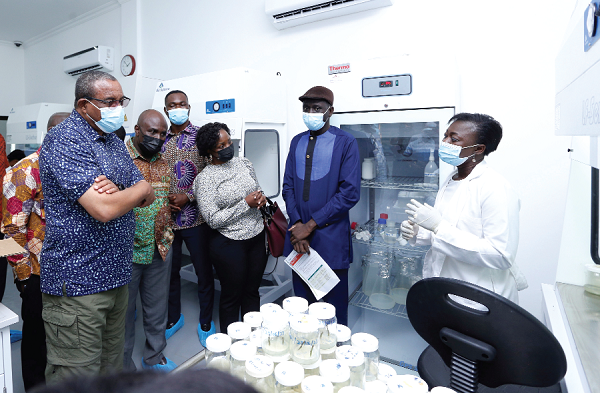
Improving food security: Desalegn urges African govts to redouble effort
The former Prime Minister of Ethiopia and Board Chairman of Alliance for a Green Revolution in Africa (AGRA), Mr Hailemariam Desalegn, has called on African governments to improve upon their agriculture yields to guarantee food security to curb conflicts on the continent.
He explained that conflict had been a source of hunger, which primarily stemmed from food insecurity.
According to him, there was a need for conscious political and humanitarian efforts to limit food insecurity on the continent.
Mr Desalegn, who made this known during an interaction with some journalists after a tour of the West Africa Centre for Crop Improvement (WACCI) at the University of Ghana (UG), said food security was the most basic requirement for a secure existence of society.
The former prime minister, who applauded Ghana for its progress in agricultural development, said various initiatives introduced over the years, including the Planting for Food and Jobs (PFJ) and activities of the WACCI had helped achieve food security.
He said the country’s enthusiasm for agriculture had made her one of the leading countries in the 16 AGRA-focused nations and charged other African countries to emulate Ghana's exploits to achieve food security and sustain agricultural activities in their respective countries.
Accompanied by some AGRA officials, Mr Desalegn, who was in Ghana on a four-day tour to assess the impact of AGRA’s investments in West Africa’s agricultural sector and to develop further opportunities for co-operation, commended management of WACCI for its impressive exploits and urged them to position the centre well to combat emerging farming challenges as a result of environmental degradation.
Asset
He said WACCI was an asset that must be supported by all stakeholders to provide essential innovation for the agriculture sector.
“WACCI is much more important than ever because of the challenges facing Africa,” he said.
Mr Desalegn noted that human capacity was at the core of any development and thus it was good to have vibrant and innovative people to help the continent catch up with the rest of the world in development.
He reaffirmed AGRA’s commitment to its relation with Ghana, noting that such partnerships were critical to reduce rural poverty, promote food security and increase household income.
149 Students
In a presentation, the Founding Director of WACCI, Professor Eric Danquah, said WACCI had trained some 149 Ghanaian and foreign students in Doctor of Philosophy (PhD) in Plant Breeding and 65 graduates in Master of Philosophy (Mphil) Seed Science and Technology.
These graduates, he said, had released 95 different varieties of soybeans, millet, cowpea, sorghum, rice, groundnut, cassava, sweet potatoes, maize and rice in Ghana, Nigeria, Mali, Burkina Faso and Niger.
The centre, he said, had developed three maize hybrids; Abɛɛfo Aburo, Akuafo Aburo and Aburo Legon which had high yield capacity and were being distributed to farmers, in collaboration with Legacy Crop Improvement Centre (LCIC) in Koforidua, where the delegation later visited.
He said lessons learnt from the collaboration was that partnership and funding of agro entrepreneurships would improve farming, create jobs, boost the economy and help achieve the Sustainable Development Goal two on zero hunger.
